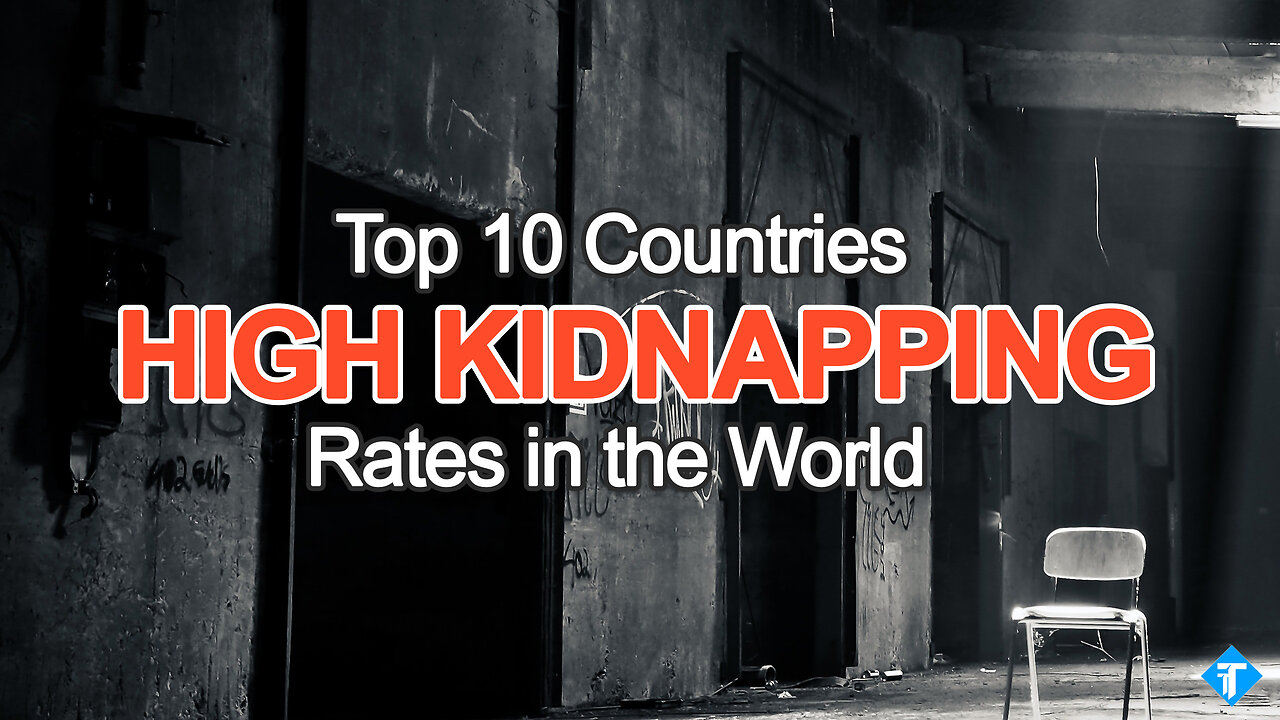Premium Only Content

Top 10 Countries with Shockingly High Kidnapping Rates - Is Your Destination on the List?
Kidnapping is a heinous crime that can happen to anyone, anywhere, at any time. It is a violent act that can leave victims traumatized for life. The motives behind kidnappings vary, but they often include political demands, ransom, revenge, or human trafficking.
In this video, we will explore the top 10 countries with the highest rates of kidnappings. According to statistics, these countries have the highest number of reported kidnappings each year.
Types of kidnapping
Kidnapping can take many forms, and criminals use different strategies to carry out their crimes. One of the most common types of kidnapping is the "Tiger kidnapping." This type of kidnapping involves taking a person's family member or loved one hostage and demanding that the victim carry out a specific task or pay a ransom to secure their release.
Another common type of kidnapping is the "Express kidnapping," where the victim is abducted and held for a short period of time, usually a few hours, until a ransom is paid. In some cases, victims are forced to withdraw money from their bank accounts or give up their possessions to secure their release.
Some kidnappings have made international headlines, such as the abduction of journalist Daniel Pearl in Pakistan in 2002 or the kidnapping of Amanda Lindhout, a Canadian journalist, in Somalia in 2008. Both individuals were held captive for months before being released or rescued.
Afghanistan
Over 150 reported cases of kidnapping each year.
Afghanistan has been a country plagued by war and conflict for decades. The ongoing conflict between the Taliban, the Afghan government, and foreign troops has created a volatile situation in the country. Kidnapping has become a common tactic used by various groups to exert their power and influence.
One of the most famous cases of kidnapping in Afghanistan is the abduction of Bowe Bergdahl, a US Army Sergeant, in 2009. Bergdahl was captured by the Taliban and held captive for five years before being released in a prisoner exchange deal.
The Taliban has been responsible for many other high-profile kidnappings in Afghanistan, including the abduction of a group of South Korean missionaries in 2007. The hostages were held for over a month, and two of them were killed before the others were released.
Kidnapping is often used as a weapon of war in Afghanistan. Hostages are taken for political demands or ransom, and the victims are often used as bargaining chips in negotiations. The kidnappings are usually carried out by armed groups, including the Taliban, criminal organizations, and sometimes even government forces.
Iraq
The ongoing violence has led to a rise in kidnappings, with over 200 reported cases each year. Kidnapping is often used as a weapon of war in Iraq, and hostages are taken for political demands or ransom.
One of the most famous cases of kidnapping in Iraq is the abduction of journalist Jill Carroll in 2006. Carroll was working for the Christian Science Monitor when she was kidnapped by a group of armed men in Baghdad. She was held captive for 82 days before being released.
The motives behind kidnappings in Iraq vary, but they often include political demands, ransom, revenge, or human trafficking. The kidnappers are often armed groups, including the Islamic State of Iraq and Syria (ISIS) and other extremist organizations.
Kidnapping for ransom is a common tactic used by criminal organizations in Iraq.
Colombia
With over 300 reported cases of kidnapping each year, Colombia has one of the highest rates of kidnapping in the world.
One of the most famous cases of kidnapping in Colombia is the abduction of Ingrid Betancourt, a Colombian politician and former senator, in 2002. Betancourt was campaigning for the presidency when she was kidnapped by the Revolutionary Armed Forces of Colombia (FARC). She was held captive in the jungle for six years before being rescued by the Colombian military.
The motives behind kidnappings in Colombia are often linked to the ongoing conflict between the government and various armed groups in the country. Hostages are taken for political demands or as a way to exert pressure on the opposing side. The kidnappers are often armed groups, including the FARC and other extremist organizations.
Yemen
Yemen has been facing a severe humanitarian crisis in recent years, with ongoing conflict and instability. Kidnapping has become a common tactic used by various armed groups in the country, with over 500 reported cases each year. Kidnapping is often used as a weapon of war in Yemen, and hostages are taken for political demands or ransom.
One of the most famous cases of kidnapping in Yemen is the abduction of three Western tourists in 1998. The tourists were traveling in the country when they were kidnapped by an extremist group. One of the hostages was killed during the rescue operation, and the others were later released.
The motives behind kidnappings in Yemen vary, but they often include political demands, ransom, and revenge. The kidnappers are often armed groups, including Al-Qaeda and other extremist organizations.
Philippines
The Philippines has been dealing with a high incidence of kidnapping for many years, with over 600 reported cases each year. Kidnapping for ransom is a major problem in the country, and criminal organizations use this tactic to make money.
One of the most famous cases of kidnapping in the Philippines is the abduction of Jeffrey Schilling, an American citizen, in 2000. Schilling was traveling in the southern Philippines when he was kidnapped by the Abu Sayyaf Group, an extremist organization. He was held captive for almost eight months before being rescued by the Philippine military.
Kidnapping for ransom is often carried out by criminal gangs and extremist organizations in the Philippines. Foreigners are often targeted because they are seen as a valuable commodity, and their governments are often willing to pay large sums of money for their safe return.
Venezuela
Over 700 reported cases of kidnapping per year.
One well-known case of kidnapping in Venezuela is the case of Wilson Ramos, a professional baseball player who was kidnapped in 2011. Ramos, who played for the Washington Nationals at the time, was visiting family in Venezuela when he was abducted by armed men. He was held captive for two days before being rescued by Venezuelan authorities.
Kidnappings in Venezuela are unfortunately not uncommon, and they often occur due to the country's severe economic crisis. With high levels of poverty, unemployment, and inflation, some individuals turn to crime as a means of survival. Kidnappings for ransom have become a particularly lucrative business for criminal gangs, who target both wealthy Venezuelans and foreigners. In some cases, criminals will even target individuals who they believe have family members living abroad and are therefore more likely to pay a ransom.
The situation in Venezuela is further complicated by political instability and a breakdown in law and order. The government's inability to effectively combat crime and corruption has allowed criminal organizations to operate with relative impunity. Additionally, the country's porous borders and connections to international criminal networks have made it a hub for illicit activities such as drug trafficking and human smuggling.
Nigeria
Nigeria has been facing a high incidence of kidnappings for many years, with over 1,000 reported cases each year. Kidnappings are often linked to the Boko Haram insurgency in the northeast and the ongoing conflict in the Niger Delta region.
One of the most famous cases of kidnapping in Nigeria is the abduction of 276 schoolgirls by Boko Haram militants in 2014. The incident gained international attention and sparked the #BringBackOurGirls campaign. While some of the girls were later released, many are still missing and believed to be held captive by the group.
Kidnappings in Nigeria are often carried out by armed groups, including Boko Haram and other extremist organizations. Hostages are taken for political demands or as a way to exert pressure on the opposing side. Additionally, kidnapping for ransom is a common tactic used by criminal organizations in Nigeria.
Pakistan
Pakistan has been facing a high incidence of kidnappings for many years, with over 1,100 reported cases each year. Kidnapping for ransom is a common tactic used by criminal gangs in the country, particularly in the tribal areas bordering Afghanistan.
One of the most famous cases of kidnapping in Pakistan is the abduction of Daniel Pearl, a journalist for the Wall Street Journal, in 2002. Pearl was investigating links between Pakistani militants and Richard Reid, the "shoe bomber" who attempted to blow up a plane in 2001. He was kidnapped by a group of militants and held captive for several days before being murdered.
Kidnappings in Pakistan are often carried out by criminal gangs, who target both locals and foreigners. Hostages are taken for ransom, and the victims are often held in remote areas where it is difficult for authorities to intervene. In some cases, kidnappers will even sell their hostages to other criminal groups.
The situation in the tribal areas of Pakistan is particularly dangerous, with ongoing conflict and instability. Militant groups, including the Taliban and Al-Qaeda, operate in the region, and there have been numerous cases of kidnapping and violence.
Mexico
Mexico has been facing a severe problem of kidnapping for many years, with over 1,300 reported cases each year. Kidnapping for ransom is a common occurrence in Mexico, and criminal organizations are often responsible for these crimes.
One of the most well-known cases of kidnapping in Mexico is the abduction of 43 students from a teaching college in Ayotzinapa in 2014. The students were traveling to a demonstration when they were stopped by the police and handed over to a local cartel. Their fate remains unknown, and the case has become a symbol of the violence and impunity that plague Mexico.
Kidnappings in Mexico are often carried out by criminal organizations, including drug cartels and other organized crime groups.
The Jalisco New Generation cartel (CJNG) is one of the most powerful and violent criminal organizations in Mexico, and they are responsible for many of the kidnappings for ransom in the country. The CJNG often targets wealthy individuals and their families, and they have been known to use extreme violence in their operations.
The situation in Mexico is complex, with ongoing violence and instability in various parts of the country.
India
Also India has been facing a serious problem of kidnapping, with over 15,000 reported cases each year. Kidnapping is often used for political demands and ransom, and criminal organizations also carry out kidnappings for profit.
One of the most well-known cases of kidnapping in India is the abduction of Rubaiya Sayeed, the daughter of the then Home Minister of Jammu and Kashmir, in 1989. She was kidnapped by militants who demanded the release of several of their comrades in exchange for her freedom. The Indian government eventually agreed to these demands, and Sayeed was released unharmed.
Kidnappings in India are often carried out by a range of actors, from political activists to criminal gangs.
-
 2:12:46
2:12:46
TheSaltyCracker
5 hours agoLefties Think Elon Stole Election ReeEEeE Stream 11-10-24
161K130 -
 1:16:52
1:16:52
vivafrei
5 hours agoNEW STREAM! Sorry peeps
108K32 -
 LIVE
LIVE
SNEAKO
5 hours agoCheesur edate, Jake Shields on election
4,840 watching -
 39:34
39:34
Nerdrotic
7 hours ago $16.03 earnedAirbursts with Dr Malcolm LeCompte & Giants and Ancient Civilizations with Hugh Newman
77.1K5 -
 1:03:38
1:03:38
vivafrei
13 hours agoElection RECAP! Long-Count Chicanery! FULL Jan. 6 Pardons! Let's Mock Lichtman & MORE! Viva Frei
138K151 -
 LIVE
LIVE
Vigilant News Network
8 hours agoDoctors Drop Post-Election COVID Bombshell | Media Blackout
5,118 watching -
 14:13
14:13
Scammer Payback
12 days agoTelling Scammers Their Address
135K84 -
 5:43:21
5:43:21
Barstool Gambling
12 hours agoBig Cat and Co Sweat Out the Week 10 Sunday Slate | Barstool Gambling Cave
107K3 -
 2:49:36
2:49:36
The Jimmy Dore Show
2 days agoRumble Time Live w/ Jimmy Dore & Special Guests Roseanne Barr, Dr. Drew, Drea de Matteo & More!
564K663 -
 17:17
17:17
DeVory Darkins
1 day agoKamala Post-Election BOMBSHELL Exposes $1 BILLION Campaign DISASTER
92.1K176